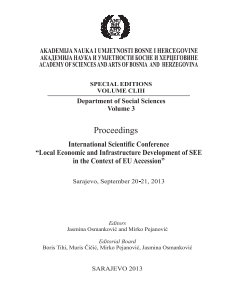CONSTITUTIONAL AND LEGAL POSITION OF MUNICIPAL AND CITY GOVERNMENTS IN STRATEGIC PLANNING AND PROMOTING LOCAL ECONOMIC AND INFRASTRUCTURE DEVELOPMENT
CONSTITUTIONAL AND LEGAL POSITION OF MUNICIPAL AND CITY GOVERNMENTS IN STRATEGIC PLANNING AND PROMOTING LOCAL ECONOMIC AND INFRASTRUCTURE DEVELOPMENT
Author(s): Veljko Trivun
Subject(s): Regional Geography, Constitutional Law, Governance, Economic policy, Government/Political systems, Politics and law, Economic development
Published by: Akademija Nauka i Umjetnosti Bosne i Hercegovine
Keywords: Local communities; Municipalities; Constitution; Economic status; Regional development;
Summary/Abstract: Nowadays, the importance of the local community is growing all over, but the fact that Bosnia and Herzegovina (hereinafter: BiH) has no state law on local self-government that would clearly define the position and the role of citizens in the system administration, is not officially recognized at the state level. Also, it is important to note that this area is not under the direct jurisdiction of any of the ministries. Given that there are entity laws and cantonal laws, or municipal statutes, there are cases of overlapping responsibilities of higher and lower levels of government, for example between entities and cantons or between cantons and municipalities. Here it is matter of the fulfilment of the obligations of BiH in terms of implementation of the principles contained in the European Charter of Local Self-Government of the Council of Europe. BiH Constitution did not specifically specify constitutional and legal position of municipal and city governments. In terms of the constitutional provisions, in the Federation of BiH cantons have all the responsibilities that are not expressly granted to the Federal Government. The Constitution of the Republic of Srpska also, among other things, determines the constitutional order based on local government. In the Brčko Distrikt situation is somewhat simpler because the District is considered a single unit of local self-government, and in this sense instruments of international law are directly applicable. Local Governance in BiH is devoted adequate attention through special entity laws. Separate entity legislation does not end the process of division of the system of local self-government, because each canton in the Federation of BiH has a law on local self-government, and in addition, municipalities have statutes. As in RS there are no regional or cantonal laws on local self-government, the municipalities are considered the base units of local government. This is an advantage in RS compared to the Federation of BiH in which the system of local government is compounded by the existence of a cantonal law. “The system of local government shall be regulated by law. A law may entrust the performance of local government tasks to the city. The city and the municipality shall be entitled to revenues determined by law and shall be provided with the funding for the performance of their duties.” The Act contains a specific provision on the so-called local governments that have followed different laws.
- Page Range: 59-77
- Page Count: 19
- Publication Year: 2013
- Language: English
- Content File-PDF

